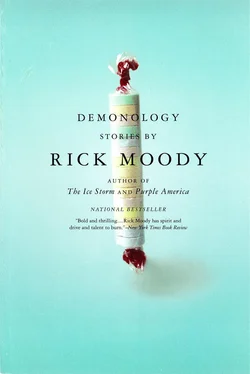— You’re on this block, honey. This is my block. I been working on this block since before you were a glint in your parents’ eyes. Get my drift? I grew up here. I didn’t move here because it’s cheaper than Greenwich Village but with good access to the city. Understand?
The window slid shut, the dogs continued to tangle. Moments later, though, the large gray steel door with multiple locks at the loading entrance of Hoboken Tool and Die swung ominously open, and out came the C.E.O. and major shareholder of the corporation, Anthony Somebody, slack in the middle section, okay he was fat, wearing a knock-off of a Van Heusen shirt purchased at the outlets in Secaucus, short-sleeved, blue flannel slacks that he was having trouble positioning at the waist (either up or down). Arms folded. Similarly, coming upon the scene, a crosstown bus screeched to a halt, between Fifth and Sixth, while Anthony labored toward the curb on his bad knees. These two events at once. Anthony offered no rationale for coming to her aid. Schoolchildren, in the windows on the lee side of the bus, pointed at the dogs, one of which had now drawn blood from another. Five bucks on the shepherd! The bus meanwhile, at its designated stop, attempted to disgorge an older woman with a walker who was wearing a plastic Ziploc bag on her grayish hair to protect her coiffure from moisture. A hush on Madison Street. The senior unable to disembark. The bus idling. Voices of children on the bus.
— Got a problem, little lady? called Anthony, from his side of the thoroughfare.
As though it were not plainly obvious. There was this party, for example, and the party was to publicize this gallery that she was starting, with her boyfriend, except that she was not certain if her boyfriend was still her boyfriend or not, because there were semantic difficulties, for example, how did you define boyfriend, because the only time he seemed as though he were her boyfriend was at parties; it was an association that only made sense in the ignoble atmosphere of parties; when not at parties, there was silence, estrangement, distance; when she tried to rectify silence, as by attempting to figure out what her boyfriend might want from her, certain outfits, certain attitudes (condemnation of popular culture), she found that he didn’t want her to make attempts to please, but he didn’t want her not to want these things either — when she called him a dick for flirting with Maria at a dinner party, for example, he didn’t like it and wouldn’t speak to her for three days, but would have liked her less if she had ignored the whole thing, the flirting, which she was inclined to do; one week he loved her, the next she could tell that her body disgusted him, even though her body was perfect, at least according to standards of a Lincoln Kirstein or a George Balanchine; and she had put her head over the toilet that very morning and felt the compressed-firehose surge of Raisin Bran and fresh peach slices, after which she toweled off, applied lotion to her hand, gargled, all this while waiting for him to go to work, God, when you were feeling the superabundance of rich creative license, you imagined a dancers body; her body would be used up and injured in five years’ time, cartilage harvested from both knees, maybe sooner, and anyway this kind of abstract posturing and psychologizing about relationships was really boring, made her weary; when women imagined they were supposed to talk about relationships, she could tell that they were uncomfortable, outmaneuvered, they were looking to protect themselves against male liberty hysteria; it was another way of being terrified, really; but, as long as she was enumerating problems, there were cocaine problems, for example; there was this guy who would deliver to their address, a reasonable Middle Eastern guy, who once even offered to put her in touch with a client of his who worked as a psychotherapist; this dealer would come by to Madison Street and buzz the capricious buzzer, there was a period wherein they had to see this guy every night, and it was uncomfortable, him telling them that their records were shit and their sofa was shit, and it wasn’t the expense of the cocaine, since her parents had some money that they were giving her, it was that her boyfriend never bought any of it; in fact, he didn’t seem very effective at earning his own cash, and so there was the problem of him owing her money for the cocaine and owing her money generally, so that she would occasionally brood over exact figures of indebtedness. Even sweet moments, like when they rented a car and drove up the Hudson and went to a farm stand and bought pumpkins, stood in a pick-your-own orchard, ill-reciting fragments of poems, That time of year thou may’st in me behold, even in sweet moments, she was calculating debt, I don’t honestly believe that you have given back a proportionate amount and even if money is irrelevant and I have enough money to a pay a larger portion of the rent it doesn’t mean that I can forgive in perpetuity the fact that I have spent more than you even if I say I love you, or she was thinking of a moment when she had gotten up in the middle of the night to guzzle orange juice and had seen him in the kitchen, at the far end of the odd commercial space that was their apartment, with a rolled-up bill and a mirror and lines and she pretended she saw nothing.
Her boyfriend had scraped the “I”off of the sign in the storefront window where they now lived together and it no longer said Madison Electric, as it had once, but now said Mad Son Electric, and that was the name of their gallery, and they had written a press release replete with art-critical language that her boyfriend had somehow acquired during his all-but-dissertation career as an analytic philosopher; the press release used liminality and numinosity and dialectic, and it referred to tactical strategies of subjectivity in postmodernism, and the Hoboken Reporter had picked the whole thing up, on the page opposite the police blotter, where the paper recorded with gusto a recent surge in arrests for public urination attributable to all the new restaurants downtown, and then on the facing page, New Gallery Brings a Touch of the Village to Midtown, featuring a photo, M. J. Powell and Gerry Abramowitz in front of the former Madison St. Electrical Corp. (He clutched a thrift-store overcoat around himself; his black self-inflicted haircut stood on end.) There would be guests, there would be drinks, there would be the wildness. No time to waste.
— I can’t get this guy and his friends off my step, I dropped my case of sodas, M. J. called to Anthony Somebody, on the far side of Madison. — I have a party starting in an hour.
— That’s nothing, Anthony said. — Couple of dogs, right? Pretty girl like you. Could be worse. Could be rats.
Anthony stepped off the curb. As though stepping across the Hudson River itself, separating this Jersey side from that NYC side, but at the moment of this historic voyage from the curb there was, unfortunately, a convergence of bad luck. A pair of young guys in sweatshirts driving what was probably a stolen Camaro slowed, and the driver of this vehicle waved at Anthony Somebody, and Anthony waved back, and one of the dogs bolted between parked cars on M. J.’ side, and everything was possible in this moment, the movements of the dramatis personae, dancers upon a proscenium, all converged, another bottle of soda popped, the Camaro swerved, struck the crosstown bus, and Mrs. John J. Vincenzo of Adams Street was thrown clear, from her perch on the steps of the crosstown bus, over her walker, and onto the pavement, onto accumulations of automobile glass, and there was a muffled cry from her, and a screech of tires, and the Camaro from the ’84 model year rumpled like an expensive suit after an evening of embraces, and Anthony Somebody, attempting to wade into the street, attempting to contribute in a civic way to a dangerous congregation of hounds, fell to the curb, grasping for his leg, so that M. J. could see the comb-over on the summit of his head. At first, she thought Anthony’s injury was a bluff, a way to deny aid in the midst of civic upheaval. But Anthony had lurched forward between Hyundai and Ford Escort, Goddamn it! collapsing onto the ground, immediately hiking up blue flannels to reveal navy blue socks of the sort that you might get at one of these haberdashers on Union Square where a guy on a stepladder served as discount law enforcement. Anthony began to rub his ankle, blaspheming softly.
Читать дальше












